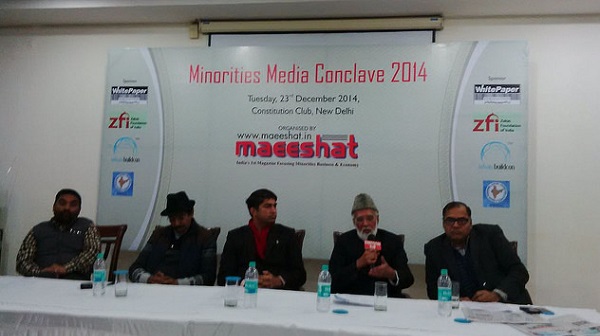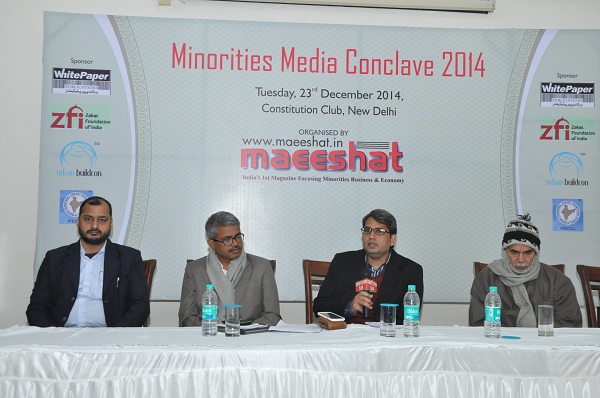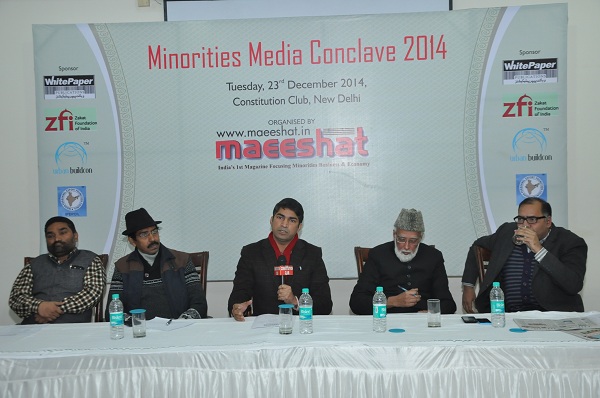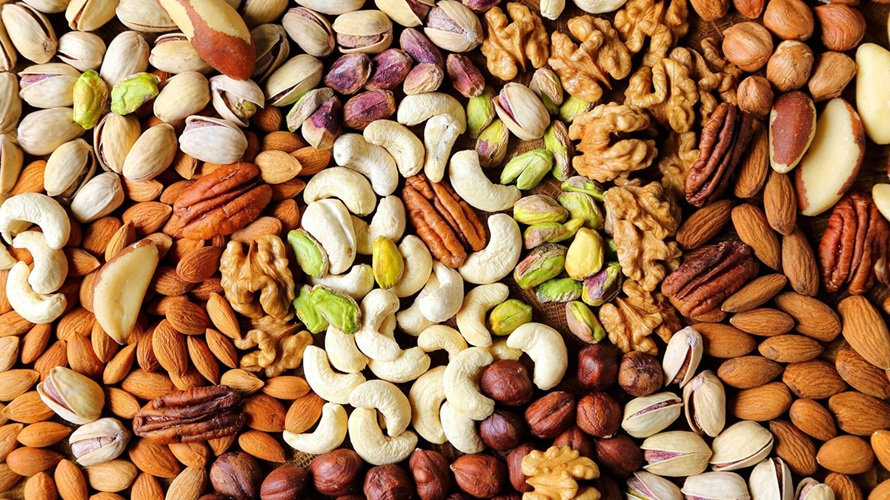By Affan Ahmad Kamil
New Delhi: A national level ‘Minority Media Conclave’ was held on 23rd Dec. 2014 at Constitution Club, New Delhi. It was an attempt to bridge the gap among different languages of media and deliberate on issues related to coverage of the minority communities.
The programme started with Danish Reyaz’s(Director of Maeeshat Media) introductory speech, he explained the purpose of the conclave.
Inaugural Speech delivered by Dr.Zafar Mahmood, president of Zakat Foundation of India and member of Sachar Committee. In his power point presentation reminding the duty of each professionals including media persons, said “You are human beings first before being media persons. So think of humanity first. Social morality should prevail over commercial interests within your premises (news establishments).”
There were two panel discussions in the conclave. Representatives from English, Hindi and Urdu media participated in the discussion.
First discussion was on ‘Bridge the gap among all mediums’ (English/Hindi/Urdu) of the media, exchange news and views; Develop consensus on all important issues’ was held under the chair of Radiance Chief editor Mr.Ejaz Ahmad Aslam. Mr.Iqbal Ahmad, BBC Senior Correspondent, Mr.Mayank Singh of News Bench, Mr. Abdussalam Asim, chief editor of UNI Urdu Service, Mr.Qasim Syed Chief editor of Roznama Khabren were the panellist.
Mr.Iqbal Ahmad pointed out, “We should ponder whether the gaps we are talking about are on wrong ground or what. Every media enjoys its own specific viewership therefore it ensures the interests of them. But there are some issues as poverty, illiteracy and injustice which should be common for all.”
Mayank Singh emphasized on the gap in the context of different media and insisted that the media persons must analysis whether “this gap is in content or issues, then talk of solutions.”
Abdussalam Asim criticized the Urdu media saying its reaction is severe. “We are on two extremes; we should come out from our comfort zone to introspect ourselves”.
On the contrary Qasim Syed defended the Urdu media: “As much as 90% of the media is in the hands of Corporates and hence they dictate our issues and problems in the view of their vested interests.”
In his presidential remark, Ejaz Aslam said “There are two major trends in our country: one who divides the people of India and second who safeguards the basic spirit and ethos of our Constitution. “We should support the second one,” he said, adding, “Our Constitution guarantees social, political and economic justice, therefore we should promote moral and human values enshrined in it.”
The second panel discussion was on Role of alternate media: Challenges & Opportunities. Presided by Mr.Ram Bahadur Rai (Editor of Yathawat; he brought the Hawala scam into light; author of Rahvari ke Sawal (on Chandrashekhar) and Manjil se Jyada Safar[1] (on V P Singh; a founder organiser of JP Movement,was the second person to be jailed under the Maintenance of Internal Security Act,(MISA).
Other panellist were Mr.Dilip C Mandal, former managing editor India Today (Hindi) (he has been associated with many media houses, worked as associate producers/Editors with Jansatta, Aaj tak,Zee News,Star News and CNBC Awaz etc.), Mr.Anil Pandey, general secretary of Delhi Journalist Association.
The second panel discussion saw vocal remarks of its president Ram Bahadur Rai. Dilip C Mandal, was hesitant to use the term ‘minority media’ and suggested: “we have to change the language and grammar of minority discourse”. He repeatedly blamed the Muslim intelligentsia on their failure with regards to the backwardness of the community. “Why Muslims are lagging behind in public sector and in education if it has not been the central point of community intelligentsia? If this is not happening, then clearly it is their failure,” he criticized and added, “Though it should be also the central question of the government. If every seventh person of this country is backward, then this country is not moving ahead but has no hope in the present government.”
Anil Pandey, cited experiments of ‘Aapan Khabar’ of Muzaffarpur, ‘Baal Ki Khaal’ magazine of Bhopal and ‘Khabar Lahariya’ as examples of an alternate media and wished a prosperous future for the same.
In his presidential speech, Ram Bahadur Rai poured out his thoughts. Terming the Press Club of India (here in Delhi) as ‘Daru Club of India’, he said: “if you visit that building, waha khabar ki khushbu nahee daru ki badboo aati hai (one finds odor of wine rather than the smell of news there at the Press Club)”.
Rejecting the idea of alternate media, he said: “I term alternate media as anarchy media”. But later on, i Q&A session he clarified: “I term alternate media, especially social media, as this is where everyone writes what he/she wants. If you show me an example of alternate media that survives on advertisement and not on the mercy of donations from corporate, then I will count it as a success story”.
He further rejected the freedom in media. “If you can’t write what you want, then how do you have freedom of expression?”
Mr.Rai demanded the Modi government to set up the third Press Commission to ensure owning of property, rights of media persons and so on to democratise the arena. He pointed out one person who is running his/her channel should not be permitted to run the radio channel or news paper or vice versa, He said but here(in India) same person is having own channel, own news paper and radio channel as well.
Question and comments from audience made the whole discussion very healthy and informative. Earlier, all participants stood silently for one minute in the condolence for martyrs (children) of Peshawar attack.








0 Comments